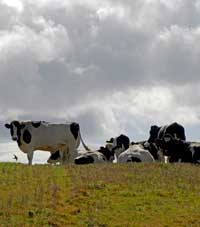Irish farmers suffer ‘devastating’ year

Falling commodity prices, unfavourable exchange rates and poor weather have combined to push Irish farm incomes down by over 30%, according to first official estimates from Ireland’s Central Statistics Office in Cork.
The figures, published on Monday (7 December) are in line with previous estimates from the Irish Farmers Association and confirm the devastating year the Irish farming sector has been facing.
The CSO incomes data reveal that the value of all farm output has dropped 19% in 2009 to just €4.7bn (£4.25bn), with all sectors suffering to some extent.
Worst affected was the country’s cereals sector, where output dropped by 52% in value to €96m (£86m). This was closely followed by dairy, where output was down 35% to €1.06bn (£954m), due mainly to the decrease in milk prices.
Irish farming’s largest sector, beef, was down 11% to €1.49bn (£1.39bn), while sheep output was 7% down at €159m (£143m).
After allowing for input costs and subsidies, the CSO estimates that the operating surplus for Irish agriculture in 2009 is down by 30.3% on last year at €1.6bn (£1.4bn) – and this follows an 11% decrease in 2008.
A statement emphasised that the data were provisional, with updates due in February 2010. “But it is worth noting that no provision has been made for any losses likely to arise from the severe flooding being experienced across Ireland.”
IFA president Padraig Walshe said the figures “represent the worst income crisis for the sector since Ireland joined the EEC in 1973”. “The stark reality is that average farm income is now at €13,000 (£11,700), and €16,000 (£14,400) for full-time farmers.”
He called on government to maintain the REPS environmental scheme, exempt farming from the proposed new carbon tax and use the tax system to encourage on-farm investment.
For a comment on this story see this posting and this posting on Phil Clarke’s Business Blog
